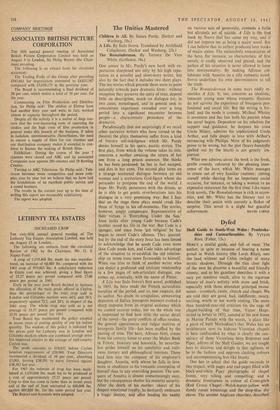The Unities Mastered
A Life. By Italo Svevo. Translated by Archibald White. (Gollancz, 18s.)
ONE comes to Mr. Purdy's new book with ex- pectation sharpened not only by his high repu-
tation as a novelist and short-story writer, but also by the fact that it includes two short plays. The ten stories which precede them seem to point naturally towards pure dramatic form : without exception they preserve the unity of time, depend little on description, much on dialogue (or, in two cases, monologue), and in general seek to concentrate experience extended over a long period into a significant encounter between people—a characteristic procedure of the dramatist.
Paradoxically (but not surprisingly if we recall other narrative writers who have turned to the theatre) the plays themselves suffer from a kind of literary self-indulgence which Mr. Purdy denies himself in his spare, ascetic stories. The first play, from which the volume takes its title, concerns a mother awaiting the return of her son from a long prison sentence. She thinks he has been pardoned; he has in fact escaped, and dies in her arms. The second play turns on a strange nocturnal dialogue between an old woman and a mysterious God-figure whom she persuades to postpone the end of the world. I hope Mr. Purdy perseveres with the drama, as he is able to get poetic reverberations into his dialogue in a very promising way. But I fear that on the stage these plays would creak like those of Synge in his off-moments. The stories, however, amply compensate. Representative of their virtues is 'Everything Under the Sun.' Jesse looks after young Cade because Cade's brother saved his life in the war. But Cade is a sponger, and since Jesse 'got religion' he has begun to resent Cade's idleness. They quarrel; but by the end of the story Jesse has been forced to acknowledge that he needs Cade even more than Cade needs him, and Cade takes advantage of the situation to re-establish the old relation- ship on terms even more favourable to himself. When one tries to think of another writer who can depict a profound and intricate relationship in a few pages of sub-articulate dialogue, one comes up, ironically, with the name of Pinter. A Life was Italo Svevo's first novel, published in 1893. Its hero reads the French naturalistic novelists of the period, and so, one suspects, did its author. No doubt its scrupulous, unwavering depiction of Italian bourgeois manners evoked a sharp response from its original audience which we cannot recover today, but on the whole one is impressed to find how little the social detail of the novel—the petty conflicts of office routine, the genteel appearances and vulgar motives of bourgeois family life—has been muffled by the passing of time. The hero, Alfonso Nitti, comes from his country home to enter the Mailer Bank in Trieste. Insecure and homesick, he neverthe- less prides himself on his sensibility and culti- vates literary and philosophical interests. These lead him into the company of his employer's daughter, Annetta, with whom he falls in love, more in obedience to his romantic conception of himself than to any overriding passion. The con- quest of Annetta is almost embarrassingly easy, but the consequences shatter his material security. After the death of his mother, object of his deepest emotional loyalty, be hesitantly embraces a tragic destiny, and after feeding his vanity on various acts of generosity, commits a futile but altruistic act of suicide. A Life is the first
book by Svevo that has come my way, and it did not impress me as being a major novel. But I can believe that its author produced later books of major status. The melancholy romanticism of the hero, for instance, so characteristic of first novels, is coolly observed and placed, and the pathos of his situation is never allowed to lapse into sentimentality. By making Alfonso col- laborate with Annetta on a silly romantic novel, Svevo underlines his own determination to tell the truth.
The Remainderman in some ways oddly re- sembles A Life. It, too, concerns an idealistic, innocent young man whose romantic illusions do not survive the experience of bourgeois pro- fessional and social life: But the setting is Ire- land, and the mode is comedy. Michael Whaley is seventeen and has lost both his parents when the novel begins. Dependent on his relatives for support and guidance, he despises his crass Uncle Hilary, admires his sophisticated Uncle Arthur, and falls deeply in love with Arthur's entrancing wife Phillipa. Most of his judgments prove to be wrong, but the plot (heavy-handedly spelled out by the blurb) is not greatly im- portant.
What one admires about the book is the fresh, gentle comedy, coloured by the pleasing inno- cence of the hero, which Mr. White manages to create out of very familiar routines: cutting oneself while shaving for an important social occasion, for instance, or taking a woman to an expensive restaurant for the first time. Like many Irish novels, The Remainderman is rich in eccen- trics, and Mr. White has the literary tact to describe their antics with scarcely a flicker of surprise. This novel is a slight but graceful






























 Previous page
Previous page